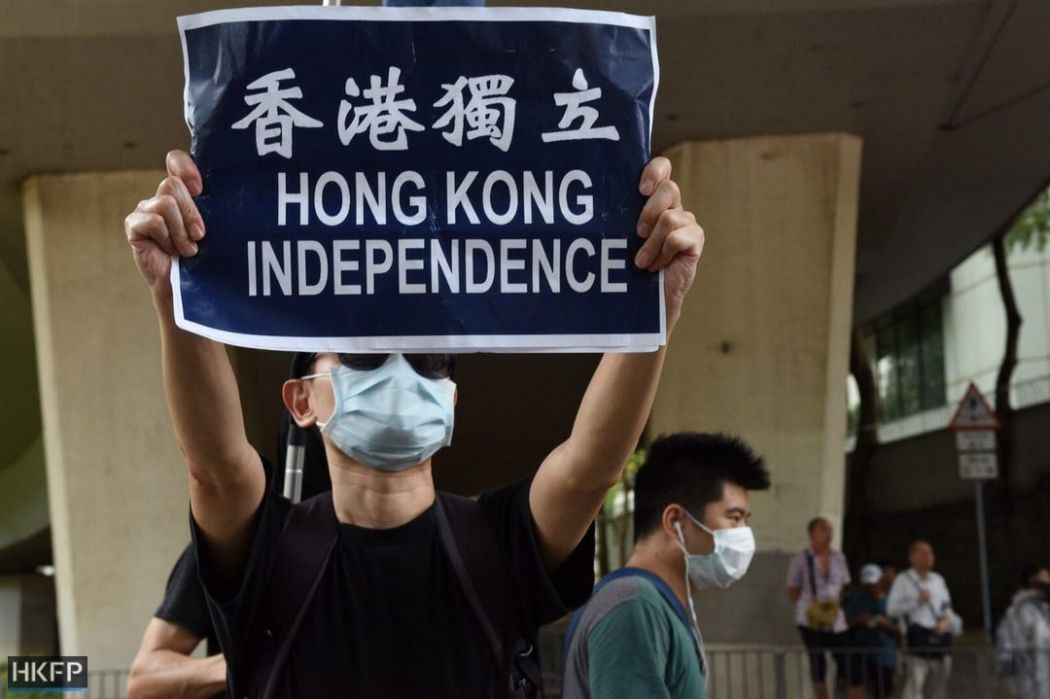In her maiden policy address, Chief Executive Carrie Lam deftly avoided direct reference to the rows over recent calls for Hong Kong independence. Instead, she spoke of the obligation of Hong Kong citizens to say “no” to attempts which threaten sovereignty and security.
Those with a passion for the city, she said, were responsible for ensuring that the city advances in the ‘right’ direction.
Anyone hoping for the address to clarify the government’s position on curbing political speech advocating self-rule would be hard-pressed to find a coherent answer.
The question whether the government would attempt to enact constitutionally mandated local national security laws also remained unanswered. The recent appearance of independence-related banners at local universities, and the calls for their removal from opponents, were not mentioned.

Few of the students involved in the independence-banner incidents would be old enough to remember July 1 2003. On that day, an estimated half a million citizens took to the streets to protest against national security laws introduced by Hong Kong’s new Beijing-backed government to replace colonial-era laws.
The huge public outcry caused the proposed laws to be withdrawn and shelved. Yet without a locally drafted body of national security ordinances, supposedly seditious offences – like advocating independence – remain beset by uncertainty.
Present laws governing seditious acts in Hong Kong reflect their British origins. References to ‘Her Majesty’s subjects’ remain, but are read as adapted in accordance with the Reunification Ordinance.
The retention of the colonial legislation however results in a legal definition of seditious acts that casts a net too wide to satisfy international norms. They include, by way of example, any act committed with the intention to ‘raise discontent or disaffections amongst inhabitants’. In the highly politicized environment that has come to define the city in recent years, the list of incidents ‘raising disaffection’ is potentially endless.
Meanwhile, promoting ‘feelings of ill-will and enmity between different classes of the population’ might sound like a subplot from Downton Abbey, yet it is a phrase plucked straight from the current wording.
There is no humour in the potential for an arcanely worded offence to be abused by prosecutors seeking to curtail political commentary. In fact, it is not even clear that advocating independence could be made a crime if the sedition laws were domestically revived — as unlikely as that seems in today’s divided political climate.

All laws in Hong Kong must be read subject to the constitutional guarantees of human rights contained in the Basic Law, particularly Articles 27 and 39 – which gives domestic effect to the rights and protections found in the International Covenant on Civil and Political Rights.
While these instruments expressly provide for protection of national security as a legitimate ground under which restrictions to the fundamental right of free expression may be imposed, any curbs must pass the strict tests of necessity and proportionality.
It is the starting position of the UN Human Rights Committee that any restriction on freedom of expression constitutes a serious curtailment of human rights. The view of the international community moreover, leans firmly towards free expression as critical to the development of democracy.
There are exceptional cases, where there is an intention to incite imminent violence, but individuals who engage in public peaceful contemplation of autonomous rule should not be targets of prosecution.
Common law jurisdictions have taken the dialogue one step further, advocating the complete abolition of sedition as a criminal offence. Law reform commissions in both the United Kingdom and Canada have long expressed doubts about the desirability of using criminal sedition laws to punish political speech.

In the UK the enactment of section 73 of the Coroners and Justice Act 2009, abolished the common law offences of sedition. In Canada, while abolition is not a fait accompli, the criminal code has elaborated that seditious acts refer specifically to acts that use force as a means of accomplishing a governmental change.
In both jurisdictions, domestic human rights statutes played an important role in curbing abusive prosecutions.
Even without going as far as abolition, wholly democratic societies can temper the impact of potentially harsh national security laws. Leaders trying to enforce restrictive laws face the threat of political damage. This is not the case in Hong Kong, where the government is not fully accountable to the public.
So the city must defend the constitutional bulwark that is free expression through judicial interpretation. Hong Kong courts, now dealing with the first wave of the Occupy Central-related prosecutions, cannot long avoid the need to reconsider the nature of the statutes dealing with sedition and their potential inconsistencies with the Bill of Rights Ordinance and the Basic Law.
The right to free expression must be protected; restrictions are not justified if they serve merely to suppress alternative non-violent political views.
